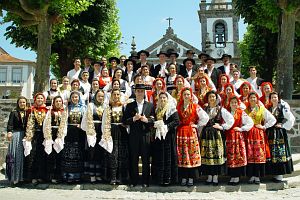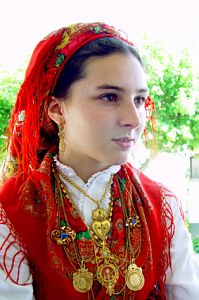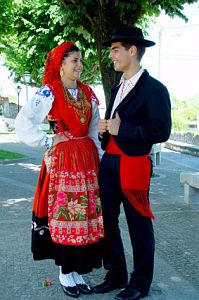Portugalia - Portugal
"Lavradeiras da Meadela" z Viana do Castelo
Wioska Meadela, która od 1988 roku stanowi część miasta Vianna do Castelo, jest usytuowana na prawym brzegu rzeki Lima w prowincji Minho. Prowincja zajmuje obszar północnego wybrzeża Portugalii. Region ten znany jest jako etnograficzna i folklorystyczna stolica Portugalii. To właśnie tu - w Meadela - w 1934 roku powstała "Grupo Folclorico das Lavardeiras da Meadela", co czyni ją jedną z najstarszych grup folklorystycznych w kraju.
 |
Przez 69 lat istnienia, zespół wciąż pozostaje wierny tradycji przodków i propaguje taniec, pieśni i muzykę typową dla dawnego chłopstwa (rolników) - stąd nazwa "Lavradeiras da Meadela". Grupa posiada ponadto bogatą kolekcje tradycyjnych strojów. Każdy robiony jest ręcznie z naturalnych włókien.
 |
 |
The village of Meadela, which has since 1988 been included into the sub-urban areas of Viana do Castelo, is situated on right hand banks of the Lima River in the Minho Province, which in turn is found on the North Coast of Portugal. This region is justifiably known as the ethnographic and folklore "capital" of Portugal. This village, marked in the past by its extremely rural characteristics, was the origin and foundation of the "Grupo Folclórico das Lavradeiras da Meadela" in 1934, which makes it one of the oldest folklore groups in the country. Throughout this group 69 years existence it still maintains the traditions inherited from its ancestors representing dance, song and music typical of the farming community of the past. Hence its name "Lavradeiras da Meadela". The Group possesses a vast and fabulous collection of traditional costumes which are very colourful, varied and vivid. Each garment is handcrafted with natural fibres and is considered to be of great patrimonial value. With its costumes, gay songs and the vivacity of its dances the Group has managed to obtain numerous prizes and distinctions in various countries in Europe, Asia and America. The Group has also participated regularly in International Folklore Festivals under the CIOFF banner and has being considered as one of the most recognized and famous groups in Portuguese folklore.
Zobacz stronę wydania...
